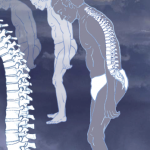NEW YORK (Reuters Health)—Ankylosing spondylitis (AS), axial spondyloarthritis (SpA) and inflammatory back pain are common in inflammatory bowel disease (IBD) patients two decades after IBD diagnosis, according to findings from the IBSEN study1.
Doctors should know IBD patients are at risk of inflammatory back problems, and refer them to a rheumatologist when appropriate, Dr. Alvilde Ossum of Oslo University Hospital in Norway, the study’s first author, told Reuters Health in a telephone interview. “It can actually damage the back more if you don’t get help,” she added.
While inflammatory back disorders are known to occur frequently in IBD patients, their prevalence is unclear, Dr. Ossum and her team note in the Journal of Crohn’s and Colitis, online September 13. To investigate, they looked at 470 patients participating in the Inflammatory Bowel South-Eastern Norway study, including 315 with ulcerative colitis and 156 with Crohn’s disease.
Twenty years after enrollment, 4.5% of study participants had AS, 7.7% had axial SpA, and 11.5% had inflammatory back pain, according to Assessment of Spondyloarthritis International Society criteria. AS prevalence in the general population is 0.26% in northern Norway and 0.25% in Europe, the researchers note, so the prevalence in IBD patients was 13 to 18 times higher.
Nearly half of the study participants reported back pain that had lasted for more than three months at some point during the past 20 years, while 4.5% had ongoing inflammatory back pain symptoms in the three months prior to follow-up.
The HLA-B27 genotype was associated with AS, SpA, and inflammatory back pain, but NOD-2 was not. Patients with a more chronic IBD course were at increased risk of axial SpA.
Widespread use of tumor necrosis factor-alpha drugs has likely made AS and axial SpA less common in IBD patients, Dr. Ossum noted. “We know that TNF-alpha can help for both the intestinal disease and the back disease,” she said.
In Norway, she added, IBD patients are now typically treated with vedolizumab, which specifically targets the gut but may not protect against spinal inflammation, so it’s possible that these patients may be more prone to AS and SpA.
Reference
- Alvilde M Ossum, Øyvind Palm, Aida Kapic Lunder, et al. Ankylosing spondylitis and axial spondyloarthritis in patients with long-term inflammatory bowel disease: Results from 20 years of follow-up in the IBSEN study. Journal of Crohn’s and Colitis. 2017 Sept. 13. jjx126. [Epub ahead of print]

